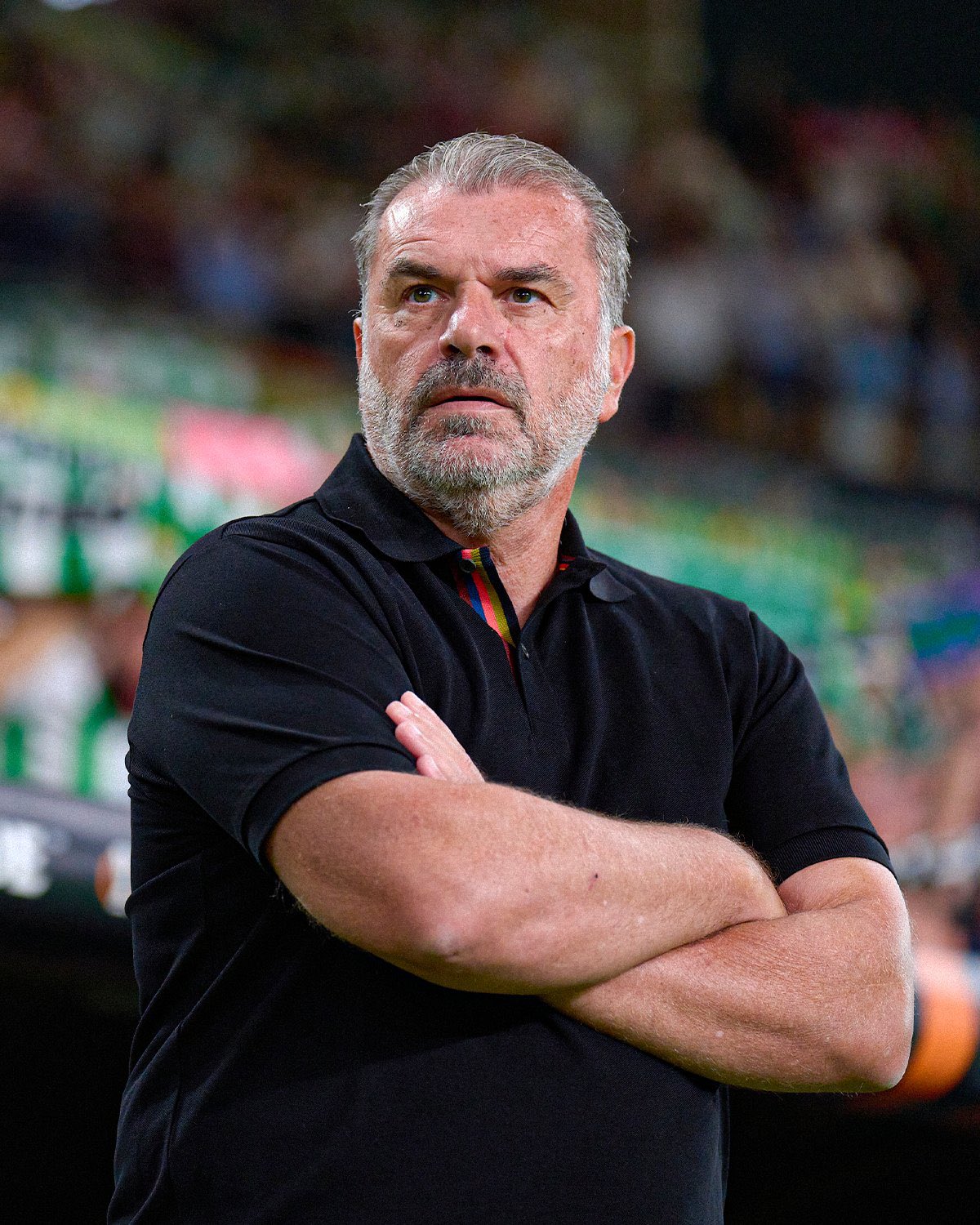

The Premier League never fails to deliver drama, both on and off the pitch, and Tottenham manager Ange Postecoglou has once again found himself in the thick of it after his side’s latest disappointing outing against Nottingham Forest. Following the final whistle, Forest fans gleefully serenaded him with chants of “you’re getting sacked in the morning,” a phrase that has become part of English football’s culture of banter but often carries undertones of genuine managerial instability. Postecoglou, however, met the taunts with the calm demeanor that has become a signature of his managerial style, brushing aside the noise and reminding everyone where his priorities lie. “The fans are disappointed, they’re entitled to have an opinion,” he said. “Nothing surprises me anymore, guess it’s the climate we’re in. Nothing I can control, my responsibility lies with getting wins.”
The chants came after another difficult game for Spurs, one that highlighted both their struggles in recent weeks and the growing frustration among opposition fans eager to see one of the league’s most hyped coaches humbled. Tottenham had started the season with a strong sense of promise, playing attractive football under Postecoglou, whose arrival last summer from Celtic was seen as a bold move by the North London club. His high-pressing, possession-based philosophy quickly won plaudits and endeared him to Spurs fans who were hungry for a new identity after years of turbulence under previous managers. But as is often the case in the Premier League, early optimism can quickly collide with reality, and results in recent weeks have placed Postecoglou under a level of scrutiny that perhaps seemed unthinkable just a few months ago.
Nottingham Forest fans seized on the moment, their chants ringing out with relish as they mocked the idea that the Australian coach might soon face the sack. For many managers, such jeering could serve as a stinging reminder of how fickle football can be, but Postecoglou’s reaction suggests he is unfazed by outside noise. His comments reflect an understanding of the modern football climate where results dictate everything, where patience is thin, and where even highly regarded coaches are never far from speculation about their future. His line, “nothing surprises me anymore,” sums up the harsh reality of top-flight management.
The reaction to his post-match words has been mixed. On one hand, Tottenham supporters appreciate his composure and refusal to engage in a war of words with fans or critics. On the other, some pundits believe his calmness might be masking a growing sense of urgency behind the scenes. For Tottenham, the issue is not simply about chants from rival fans—it is about turning around a run of form that has threatened to derail their season. Postecoglou’s insistence that his only responsibility is “getting wins” is both a statement of focus and an acknowledgement of the immense pressure that comes with his position.
What makes this situation even more intriguing is that Tottenham, under Postecoglou, have not looked like a team in complete crisis. They are still producing flashes of brilliant football, still showing signs of a team in transition. But football is a results business, and in England, results have a way of defining narratives far more quickly than performances. The chants from Forest fans may not have originated from Tottenham supporters, but they reflect a larger conversation that inevitably begins to swirl when a club of Spurs’ stature experiences a dip in form. Every manager knows that rival fans sense blood in the water and will amplify the pressure with chants designed to sting.
The climate Postecoglou referred to in his remarks is a product of the modern football ecosystem where social media amplifies every misstep, fan expectations are heightened by massive transfer fees and wages, and club owners are less willing than ever to let projects take time. Tottenham themselves have been through a carousel of managers in recent years, from Mauricio Pochettino to José Mourinho, from Nuno Espírito Santo to Antonio Conte. Each appointment was supposed to be the turning point, each departure marked by disappointment, and each transition leaving the club searching for stability. In many ways, Postecoglou was brought in to provide exactly that: stability, a long-term vision, and a return to football that Spurs fans could believe in.
His response to the chants therefore underscores the bigger challenge—navigating not just the tactical and competitive side of the Premier League, but also the emotional and cultural pressures that come with being at the helm of a club with such high expectations. By saying “nothing I can control,” Postecoglou is both shielding himself from the toxic narrative and reminding everyone that football is ultimately measured by what happens on the pitch. Managers cannot control what fans chant, what pundits say, or what rumors swirl in the press. What they can control is preparation, strategy, and performance, and it is clear that Postecoglou remains determined to focus on those aspects rather than get drawn into the noise.
For Spurs supporters, his composure may serve as reassurance, but the clock is ticking. The Premier League is notoriously unforgiving, and while rival fans might mock with chants of an imminent sacking, the real concern lies in whether Tottenham can quickly rediscover their winning ways. Postecoglou’s philosophy is not one that can be fully embedded overnight, and patience is required. Yet in the “climate we’re in,” as he put it, patience is a rare commodity. Spurs’ hierarchy will have to balance their long-term vision with the immediate need for results to keep the season alive.
The episode at Nottingham Forest is just the latest example of how thin the margins are in elite football. A run of victories could instantly change the mood, silence the chants, and restore confidence in the project. A continued string of poor results, however, will only fuel speculation and invite more mockery from rival fans. Postecoglou’s words may not silence the doubters, but they show he is not shaken by them. The chants of “you’re getting sacked in the morning” may have been aimed to rattle him, yet his response suggests he is seasoned enough to absorb the noise and keep his focus on the task at hand.
As Tottenham prepare for their next fixtures, the spotlight will remain firmly on Postecoglou. Every lineup decision, every substitution, and every post-match remark will be scrutinized in the context of whether he can steady the ship. Fans and pundits alike will be watching to see if the Australian can turn words into action, delivering the wins that are ultimately the only currency that matters. For now, he remains steadfast, reiterating that his only concern is getting results, even as the outside world attempts to question his future.
Football has always thrived on drama, and chants like the ones directed at Postecoglou are part of the theater of the game. Yet beneath the banter lies a deeper truth about the precarious nature of management in the Premier League. Postecoglou knows it, the fans know it, and the media will never let him forget it. Whether the chants turn out to be nothing more than empty taunts or a foreshadowing of trouble ahead will depend entirely on Tottenham’s response in the coming weeks. One thing is certain: Ange Postecoglou is not about to let rival fans dictate his mindset. His focus remains clear—wins, points, and progress for Spurs, regardless of what songs are sung from the stands.


